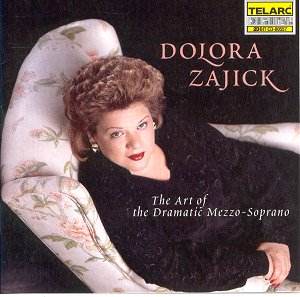The Art of the Dramatic Mezzo
Soprano
TCHAIKOVSKY Joan of Arc - Farewell, dear hills and
fields.
MUSSORGSKY Khovanshchina - Forces
mysteriousa.
CILEA Adriana Lecouvreur - Acerba voluttà.
ROSSINI Semiramide - Ah! Quel giorno ognor rammento.
MASCAGNI Cavalleria Rusticana - Voi lo sapete.
SAINT-SAËNS Samson et Dalila - Mon coeur s'ouvre à
ta voix.
GLUCK Alceste - Divinités du Styx. Orphee et
Eurydice - J'ai perdu mon Euridice. VERDI
Don Carlo - O don fatale. Trovatore - Condotta ell'era in
ceppia. Macbeth - La luce langue; Una macchia è qui
tuttora.
 Dolora Zajick (mezzo); Royal
Philharmonic Orchestra/Charles Rosencrans with aPiero Giuliacci
(tenor).
Dolora Zajick (mezzo); Royal
Philharmonic Orchestra/Charles Rosencrans with aPiero Giuliacci
(tenor).
 Teldec CD-80557 [DDD]
[69'25]
Teldec CD-80557 [DDD]
[69'25]
Crotchet

Allegedly, Birgit Nilsson once referred to Dolora Zajick in the most lavish
of terms: 'Zajick's voice is the only one existing today without any competition
in the World'. Praise indeed, and the sheer range of Zajick's engagements,
from La Scala to Covent Garden, from the Met to the Vienna State Opera, attest
to her popularity. Zajick has a musty but not overly throaty voice, which
means she has few problems cutting through difficult orchestral textures.
This recital covers a wide variety of roles in several languages. Her rendition
of Tchaikovsky's Farewell, dear hills and fields captures the yearning
quality well and paves the way for a similarly involving Horoscope Scene
from Khonanshchina. The climax of Acerba voluttà shows
just how powerful her voice is.
It is only at the Semiramide aria that slight doubts begin to creep
in. She has plenty of punch in the lower register, but the actual pitching
of the notes could be cleaner. Neither does she plumb the depths in O
don fatale - compare the Eboli of Shirley Verrett in Giulini's recent
reissue on EMI Great Recordings of the Century to hear the difference (CMS5
67401-2). A similar fault lies in her Trovatore aria.
I question the inclusion of the Gluck arias. Zajick makes no claim towards
authenticity: a word of warning, then, that there is a certain amount of
slipping and sliding going on here.
In a recital firmly planned around Zajick's strengths, it is only fitting
that she ends (literally and metaphorically) on a high note. She makes an
eminently convincing Lady Macbeth and despite a seeming shift of focus in
the voice in Una macchia (the Sleepwalking Scene), she shows off her
affinity with Verdi excellently. The listener is left with a sense of exhausted
satisfaction.
'The Art of the Dramatic Mezzo Soprano'?. It (almost) does exactly what it
says on the packet.
Reviewer
Colin Clarke
Performance

Recording


